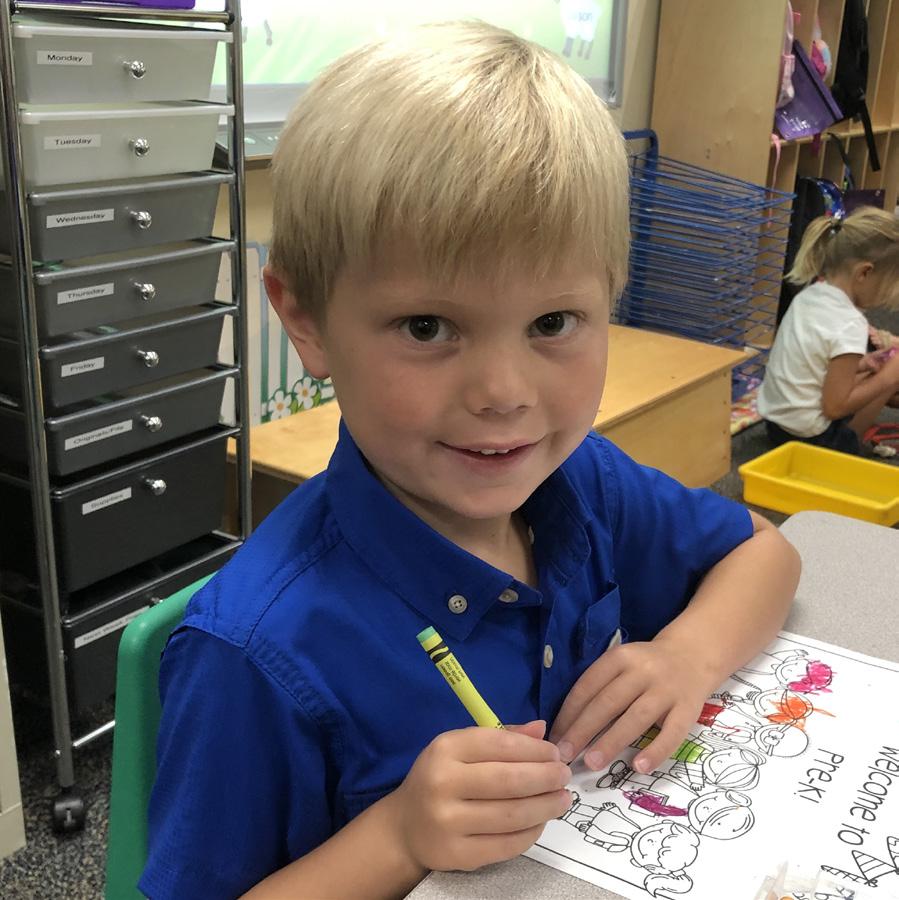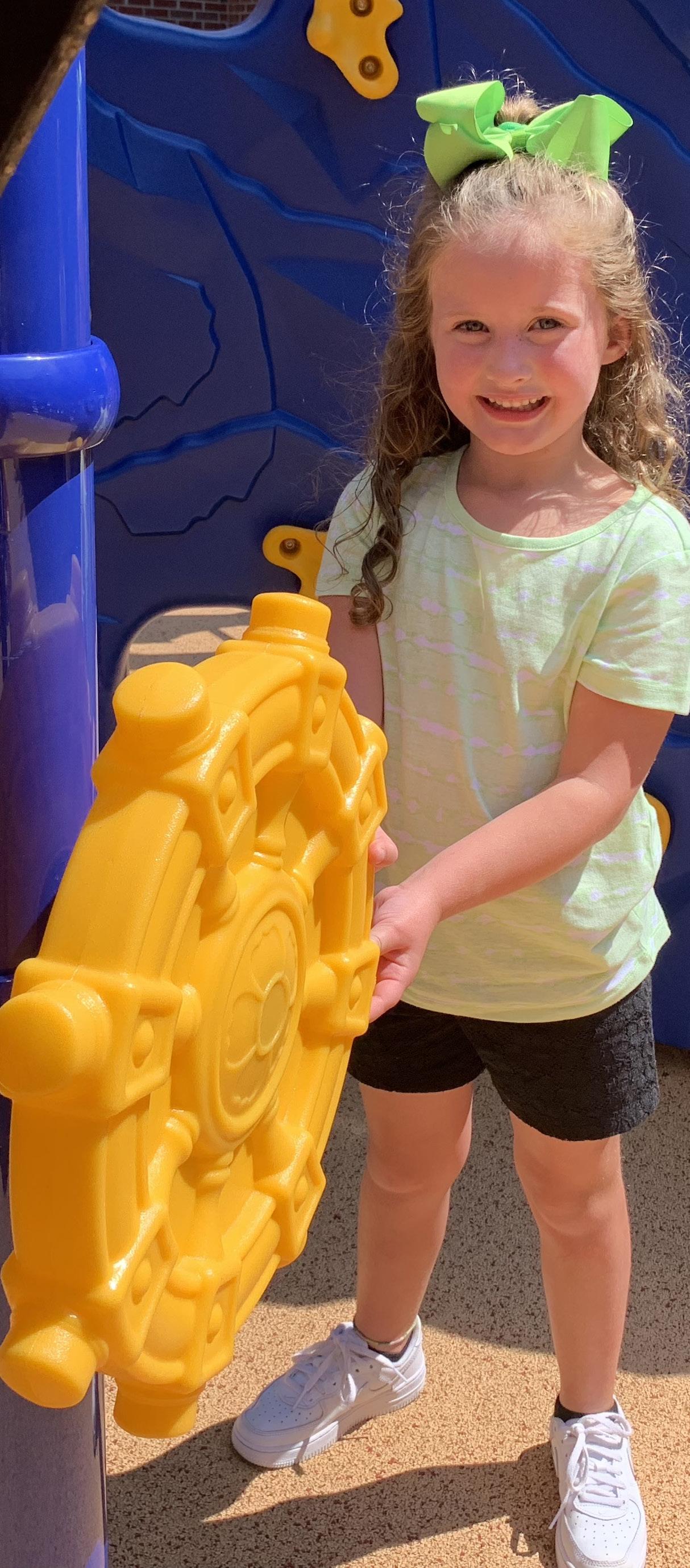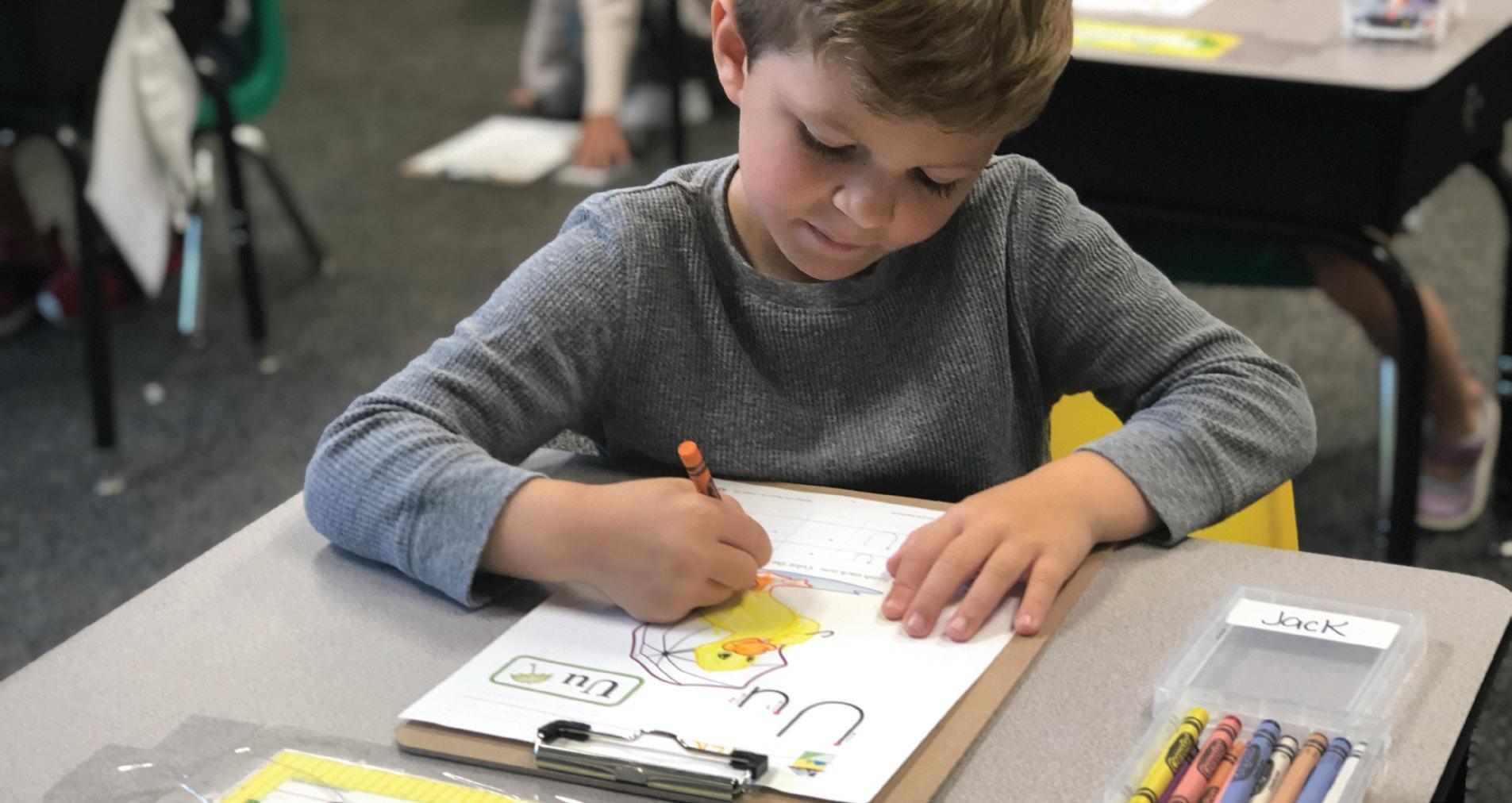

IS YOUR CHILD READY FOR PRESCHOOL?
A Preschool Readiness Guide for Parents



IS YOUR CHILD READY FOR PRESCHOOL?
Train up a child in the way he should go; even when he is old he will not depart from it.
Proverbs 22:6
There are certain skills that you can help your child develop so that he or she will be prepared to excel in preschool.
There are many ways you can help your child develop richly so that he or she will be prepared to excel in preschool and beyond. Children develop on their own unique, God ordained timetable. Utilize the suggestions in this guide to work toward your child’s preschool readiness. You, as a parent/caregiver, can provide an environment that is rich with opportunities to help your child expand their intellectual, emotional, physical and spiritual development to the fullest potential for His glory.
This guide will break down key areas of development that are critical for school success.
• Appropriate Use of Technology
• Fine Motor Development and Pre-Writing Skills
• Gross Motor Development
• Pre-Reading and Language Skills
• Beginning Math Skills
• Social and Emotional Development
Suggestions to Enhance the Readiness of Preschool Students

APPROPRIATE USE OF TECHNOLOGY
Technology has become a large piece of our everyday lives. When offered in healthy amounts, supervised and with quality content, technology can enhance the development of a child. However, when offered unlimited, unsupervised and without quality content, a child can miss out on other vital areas of development and perhaps develop bad habits and behavior.
Content Matters
• Research apps. An educational and interactive app requires more than swiping to teach your child. Look for organizations that review age-appropriate apps, games, and programs. The quality of content is more important than the platform or time spent with media.
Set Limits
• Set limits on the amount of media use in your home. Limit technology to no more than an hour per day for your preschoolaged child. Children thrive with boundaries and limits. Prioritize how your child spends his time rather than just setting a timer. Ask whether your child’s technology use helps or hinders participation in other activities.
Be a Good Role Model
• Limit your own technology use and model this behavior for your children. Attentive parenting requires you to spend quality time with your children outside of technology.
Preserve Technology-free Play and Family Time
• It is important to intentionally preserve these times. Remember to include unstructured playtime as it stimulates creativity. Mealtime and bedtimes should be technologyfree. These limits encourage family time, healthier eating habits, and healthier sleep.
Fine Motor Development and Pre-Writing Skills
Fine motor development focuses on the small muscles of the hand. The hand should have adequate strength, dexterity, and coordination to grasp and manipulate objects of different sizes, weights and shapes. The muscles in the hands need exercise just like other muscles in the body for appropriate development. A preschool aged child will benefit greatly with 20-30 fun minutes of fine motor activities daily. Good fine motor development leads to good writing skills and other every day functional tasks. Here are suggestions of ways to incorporate fine motor activities into your child’s daily routine:
• Encourage the correct grip of writing utensils like pencils and crayons, as opposed to a fisted grip.
• Use coloring books to help your child learn to color neatly within the lines.
• Give your child a chance to draw and color on a blank page.
• Practice cutting straight and curved lines with ‘thumb up’ using blunt tip scissors.
• Use a hole punch to punch holes in various materials like paper, leaves and so much more.
• Use large-handled tweezers to pick up small items, transferring the small items from one place to another.
• Practice clipping clothespins on paper or using them to hang small items on a clothesline.
• Tear paper into small pieces and glue to create a mosaic picture or collage.
A Preschool Readiness Guide for Parents
• Stack small blocks to balance or use small building blocks to create.
• Spill and pick up fun cereal with pincher fingers, the thumb and pointer finger.
• Use Play-Doh, putty or slime. Practice rolling, cutting, squishing, and creating.
• Practice drawing lines, curves, and shapes with any writing tool. You can also use one finger to draw in something like flour or use a stick to draw in sand outside. Using stencils for tracing is also fun.
• Decorate or create outside with sidewalk chalk.
• Paint with water on driveways, fences or sidewalks on warm weather days.
• Assemble simple puzzles.
• Lace beads, cut straws, or round cereals on a string or pipe cleaner.
• Allow your child to check or mark off items on a list in the grocery store.
• Write letters, numbers, words, or your child’s name and let them practice tracing it with their finger or other writing tools.
• Learn to zip and button jackets/coats as well as tie shoes.

A Preschool Readiness Guide for Parents

Gross Motor Development
Gross motor development involves use of large muscles in the legs, arms, and torso. Encourage your child to be physically active daily. Provide your child a space indoors and outdoors to exercise these large muscles. Here are some suggestions of ways to offer gross motor activities into your child’s daily routine:
• Teach your child to skip, gallop, hop, jump on one foot, walk backwards, balance walking on a line, etc.
• Throw, catch, and kick balls with your child.
• Consider owning play items such as a scooter, bicycle/tricycle, hula hoops, sports balls, jump ropes, wagon, etc.
• Make household chores fun for children to practice gross motor development- like throwing laundry into a basket, moving laundry from the washer to dryer or dryer to a basket, unloading the dishwasher, setting the table, sweeping, cleaning windows, etc.
• Teach your child to dress and undress themselves. This includes putting on a coat/ jacket, socks, and shoes.

Pre-Reading and Language Skills
• Work with your child to have them follow through with multi-step directions given orally.
• Label items, when possible, with your child’s name. They should begin to recognize it and know the letters.
• Read stories and sing songs to your child every day. Share some of your favorites from when you were a child.
• Ask questions to ensure comprehension of the stories you read. Ask your child what happened in the beginning, middle and end.
• Talk to your child about the characters in the stories you read.
• Include questions about character motivations to improve reasoning and thinking skills. Questions like, “Why did the character make a certain decision?”, or “Would you have made the same decision?”.
• Allow your child to ‘read’ you a story by telling what they see in the pictures of a book.
• Make up stories together and ensure they can recognize fact from fiction.
• Introduce your child to rhyming words and opposites. Choose books to read that purposefully focus on these skills.
A Preschool Readiness Guide for Parents
• Point to the words in pre-reading books as you read. This will help your child begin to recognize sight words and will help them learn to read from left to right.
• Consider getting a county library card. You can create a fun, anticipated routine taking your child to pick out new books weekly or bi-weekly.
• Talk to your child about sequence of events. Allow them a hands-on teaching opportunity to put pictures in order like pictures of them growing up- baby, toddler, child.
• Consider purchasing letter magnets your child can play with on the refrigerator or on a cookie sheet. Help them begin to recognize letters starting with the letters in their name. Help your child sort and understand letters versus numbers.
• Point out letters and words in the environment around you.

A Preschool Readiness Guide for Parents

Beginning Math Skills
• Introduce your child to patterns – AB, ABB, and ABC.
• Give opportunities for your child to count items from one to ten. This can be done in simple ways like counting the silverware when putting it away. It can also be done as a scavenger hunt where you tell your child to find a certain number of items that are a specific color, shape, or nature items outside.
• Provide geometric shapes to match. Teach correct names of shapes. Identify items in the environment that have those same shapes.
• Teach position words in a fun way. These words include over, under, inside, outside, behind, in front of, etc.
• Teach your child concepts of addition and subtraction by introducing vocabulary such as more/less and most/least. You can also read books and sing songs in which the characters are added or subtracted as the story progresses.

A Preschool Readiness Guide for Parents

Reasoning and Thinking Skills
• Give opportunities for your child to sort items according to color, shape, size, etc. Have your child explain similarities and differences using their words.
• Identify and sort things that go together such as shoe/sock and bowl/spoon.
• Pose a problem to your child that requires building a solution. An example could be, “build a bridge so that five matchbox cars can sit on it without falling off”. This will help them improve their reasoning and thinking skills. Provide everyday items to encourage their creativity to build the solution. Examples would be popsicle sticks, toilet paper rolls, index cards, etc.
A Preschool Readiness Guide for Parents
Social and Emotional Development
Children need praise and encouragement as well as discipline. Praise your child for their strengths and encourage your child to feel excited about their own interests. This will help your child develop a sense of pride and self-confidence.
Words like “Well Done” or “Good Job” are examples of praise. However, being more specific with your praise can better motivate your child. Examples like, “I like that you chose gray to color that rain cloud”, “You came up with such a thoughtful answer”, or “It was so kind of you to be patient waiting your turn”. Also, try praising your child’s efforts and the process, not their achievement or ability. Doing this can help your child develop intrinsic motivation, perseverance, and positive self-esteem.
Don’t be afraid to let your child mess up or make a mistake. As long as they are safe, it is a great
opportunity to teach how to positively respond, learn to appreciate practice, and accept being an imperfect person.
Create situations that allow your child to learn to:
• Separate from caregivers without being excessively upset.
• Adjust to minor changes in schedule.
• Accept minor disappointments without tears.
• Stay with a task or activity to completion, even when difficult or not preferred.
• Make good use with free time.
• Work independently on a craft or activity.
• Pose age-appropriate problems and allow your child to reason and talk through a solution.

A Preschool Readiness Guide for Parents

Preschool children are not too young to begin using manners on a regular basis. Model the desired behavior and remind your child, as necessary.
Important social manners to teach and model:
• Help with household tasks and chores.
• Clean up toys or games before moving to play with a different toy or game.
• Teach and model table manners like chewing with mouth closed, not speaking with food in their mouth, using utensils properly, and taking small bites.
• Look at people when they speak.
• Do not interrupt when someone else is speaking.
• Listen attentively. Be quick to listen and slow to speak.
• Be sensitive to needs and feelings of others. Treat others as you want to be treated.
• Respond respectfully and favorably to adult direction and correction.
• Consistently ask for things using “Please” and respond with “Thank You”, “Yes/No Ma’am” and Yes/No Sir”.
• Wait his or her turn and share and play cooperatively with others.
• Make eye contact, smile, and say, “It’s a pleasure to meet you”, when introduced to someone.
• Encourage your child to ask for help when it is needed. Try not to assume their needs if you know they can ask.


